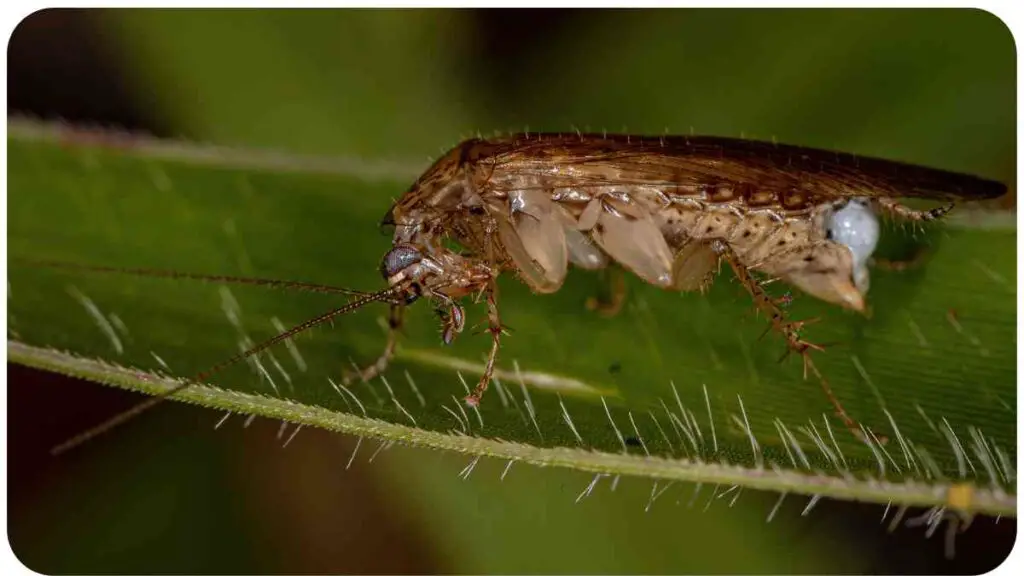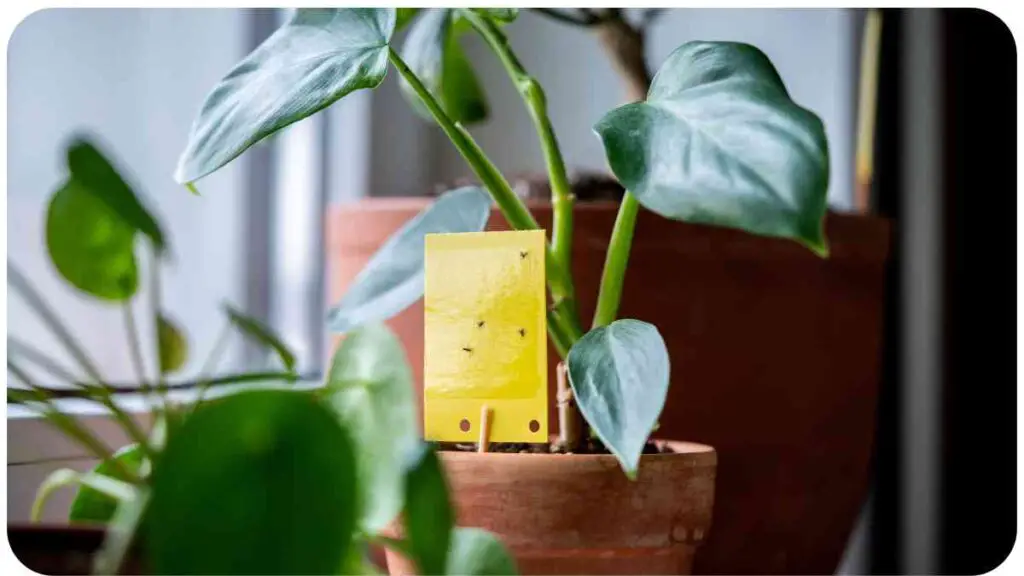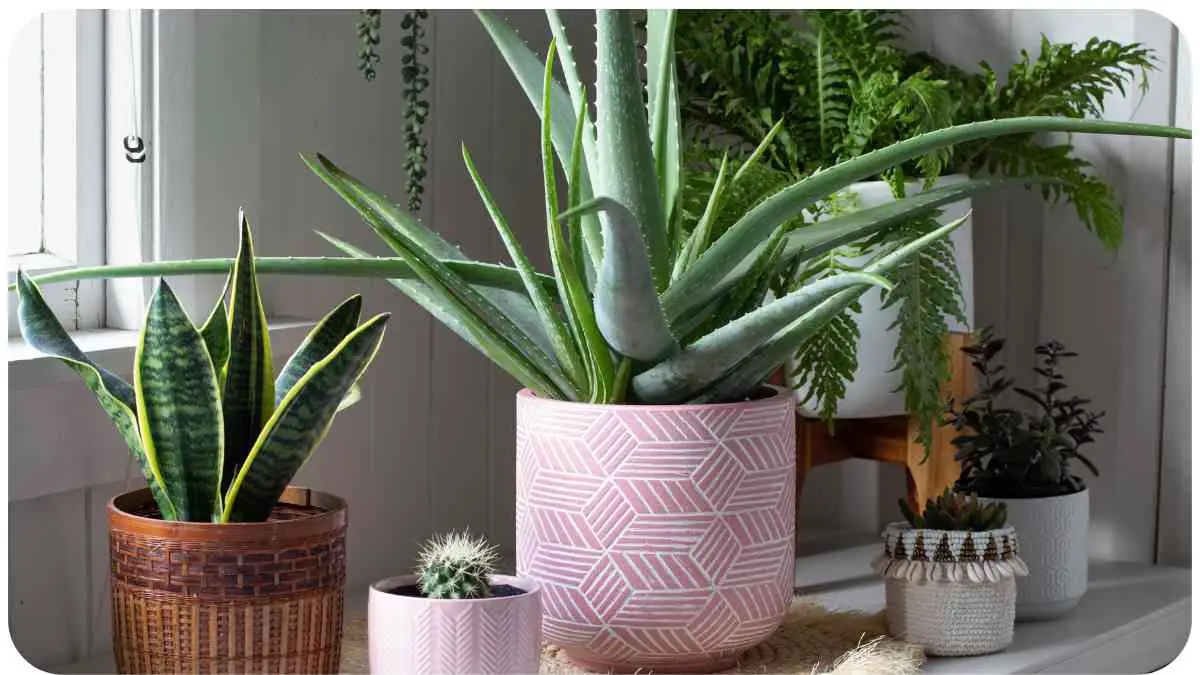House plants can add beauty and freshness to any home, but they can also attract unwanted pests like cockroaches. Dealing with a cockroach infestation in your beloved house plants can be frustrating and challenging.
However, with the right techniques and preventive measures, you can keep cockroaches at bay and ensure your plants remain healthy and pest-free.
| Takeaways |
|---|
| 1. Regularly inspect house plants for signs of cockroach infestation. |
| 2. Choose well-draining soil to discourage cockroach nesting. |
| 3. Practice proper watering techniques to minimize moisture. |
| 4. Use natural remedies like diatomaceous earth and neem oil for pest control. |
| 5. Consider chemical treatments and traps for severe infestations. |
| 6. Create physical barriers to prevent cockroaches from accessing plants. |
| 7. Seek professional help if DIY methods fail or infestations persist. |
2. Understanding the Problem
Before diving into solutions, it’s essential to understand why cockroaches are drawn to house plants in the first place. Cockroaches are attracted to warmth, moisture, and food sources, all of which can be found in abundance in potted plants. The organic matter in potting soil provides an ideal environment for cockroaches to thrive, leading to infestations if left unchecked.
To maintain a vibrant garden, ensuring soil quality is paramount. Consider implementing best soil practices for optimal plant growth and health. It’s the foundation for flourishing flora.
3. Signs of Cockroach Infestation

Identifying a cockroach infestation in your house plants is crucial for taking prompt action. Some common signs include:
| Signs of Cockroach Infestation |
|---|
| Chewed leaves or stems |
| Fecal droppings |
| Unusual odor around plants |
| Sightings of cockroaches |
If you notice any of these signs, it’s essential to act quickly to prevent the infestation from spreading further.
4. Reasons Cockroaches Are Attracted to House Plants
Understanding why cockroaches are drawn to your house plants can help you implement more effective prevention strategies. Here are some reasons why cockroaches might be attracted to your indoor greenery:
In urban settings, successful gardening requires strategic planning and execution. Explore these urban gardening tips for a bountiful harvest right at home. Embrace the joys of homegrown produce!
Table: Reasons Cockroaches Are Attracted to House Plants
| Reasons | Explanation |
|---|---|
| Moisture | Cockroaches are attracted to damp environments, and the moist soil in house plants provides an ideal breeding ground for them. |
| Organic Matter | Potting soil contains organic matter such as decomposing plant material, which serves as a food source for cockroaches. |
| Warmth | House plants are often kept indoors where temperatures are warmer, creating a cozy environment that cockroaches find inviting. |
| Shelter | The dense foliage of house plants offers shelter and hiding places for cockroaches to nest and breed, making it difficult to detect an infestation until it’s well-established. |
By addressing these factors, you can make your house plants less appealing to cockroaches and reduce the risk of infestation.
5. Prevention Techniques
Preventing cockroaches from infesting your house plants requires a multi-faceted approach that addresses their attraction to moisture, food, and shelter. Here are some effective prevention techniques:
Choosing the Right Soil
Selecting well-draining soil that dries out quickly can help discourage cockroaches from nesting in your house plants. Avoid overwatering your plants, as excessively damp soil is more attractive to pests.
Proper Watering Techniques
Water your plants at the base rather than overhead to minimize moisture on the soil surface. Empty saucers promptly to prevent water from pooling around the roots, as stagnant water can attract cockroaches.
Regular Maintenance
Inspect your house plants regularly for signs of pest activity, such as chewed leaves or droppings. Prune away dead or decaying plant matter and remove fallen leaves from the soil surface to eliminate potential food sources for cockroaches.
When tending to your garden, keeping pests at bay is essential for plant health. Learn effective pest management strategies to safeguard your plants from harmful invaders. A thriving garden begins with pest-free soil.
6. Natural Remedies
Natural remedies offer an eco-friendly and non-toxic approach to controlling cockroach infestations in house plants. Here are some effective natural remedies to consider:
Diatomaceous Earth
Diatomaceous earth is a natural, abrasive powder made from the fossilized remains of tiny aquatic organisms called diatoms. Sprinkling diatomaceous earth around the base of your house plants creates a barrier that dehydrates and kills cockroaches upon contact.
Neem Oil
Neem oil, derived from the seeds of the neem tree, is known for its insecticidal properties. Dilute neem oil with water and apply it to the soil of your house plants to repel cockroaches and other pests. Neem oil also disrupts the growth and development of insect larvae, helping to control infestations.
Coffee Grounds
Used coffee grounds not only enrich the soil of your house plants but also act as a natural repellent for cockroaches. Sprinkle coffee grounds on the surface of the soil to deter cockroaches and other insects. Additionally, the acidity of coffee grounds can help regulate soil pH, creating less hospitable conditions for pests.
Essential Oils
Certain essential oils, such as peppermint oil, lavender oil, and tea tree oil, possess insect-repelling properties. Dilute a few drops of essential oil in water and spray it onto the foliage and soil of your house plants. The strong scent of these oils acts as a deterrent for cockroaches while adding a pleasant fragrance to your home.
Table: Natural Remedies for Cockroach Control
| Natural Remedies | Description |
|---|---|
| Diatomaceous Earth | Abrasive powder that dehydrates and kills cockroaches upon contact. |
| Neem Oil | Insecticidal oil derived from the neem tree seeds, disrupts insect growth and repels pests. |
| Coffee Grounds | Natural repellent for cockroaches, enriches soil, and regulates pH levels. |
| Essential Oils | Peppermint, lavender, and tea tree oils possess insect-repelling properties and add fragrance to your home while deterring pests. |
By incorporating these natural remedies into your pest control routine, you can effectively keep cockroaches out of your house plants without resorting to harsh chemicals.
7. Chemical Treatments
In cases of severe cockroach infestations where natural remedies alone may not be sufficient, chemical treatments can provide effective control. Here are some common chemical treatments used to eradicate cockroaches from house plants:
Root rot can spell disaster for houseplants if left unchecked. Arm yourself with knowledge on root rot prevention to safeguard your indoor greenery. Healthy roots, happy plants!
Insecticidal Soap
Insecticidal soap is a natural pesticide made from potassium salts of fatty acids. It works by suffocating soft-bodied insects like cockroaches upon contact. Apply insecticidal soap to the foliage and soil of your house plants according to the manufacturer’s instructions to eliminate cockroach infestations.
Pyrethrin-Based Sprays
Pyrethrin-based sprays are derived from chrysanthemum flowers and are effective against a wide range of insect pests, including cockroaches. These sprays quickly kill cockroaches upon contact and have a low toxicity to humans and pets when used as directed.
Bait Stations
Bait stations are small containers filled with a toxic bait that attracts and kills cockroaches. Place bait stations near infested house plants to lure cockroaches away from your greenery and eliminate them at their source. Be sure to keep bait stations out of reach of children and pets.
Table: Chemical Treatments for Cockroach Control
| Chemical Treatments | Description |
|---|---|
| Insecticidal Soap | Natural pesticide made from potassium salts of fatty acids, suffocates soft-bodied insects like cockroaches upon contact. |
| Pyrethrin-Based Sprays | Derived from chrysanthemum flowers, quickly kills cockroaches with low toxicity to humans and pets when used as directed. |
| Bait Stations | Small containers filled with toxic bait that attracts and kills cockroaches, placed near infested areas to lure pests away from house plants. |
When using chemical treatments, always follow the instructions carefully and take necessary precautions to ensure the safety of yourself, your family, and your pets.
8. Traps and Barriers
Traps and barriers provide a passive yet effective way to capture and contain cockroaches, preventing them from infesting your house plants further. Here are some types of traps and barriers you can use:
Sticky Traps
Sticky traps consist of adhesive surfaces that trap cockroaches as they crawl across them. Place sticky traps near the base of your house plants to capture wandering cockroaches and monitor the severity of the infestation. Regularly check and replace sticky traps as needed.
Cockroach Traps
Cockroach traps are baited devices designed to attract and trap cockroaches. These traps typically contain a food-based lure that entices cockroaches inside, where they become trapped and unable to escape. Cockroach traps can be placed strategically around infested house plants to reduce cockroach populations.
Physical Barriers
Creating physical barriers around your house plants can help prevent cockroaches from accessing them. Place sticky tape or double-sided tape around the base of plant pots to deter cockroaches from climbing up. Additionally, consider placing plant pots on stands or trays filled with soapy water to create a barrier that cockroaches cannot cross.
Weed control is a vital aspect of garden maintenance to promote plant growth. Discover the benefits of using black plastic for weed control and keep your garden thriving. Say goodbye to pesky weeds!
Table: Traps and Barriers for Cockroach Control

| Traps and Barriers | Description |
|---|---|
| Sticky Traps | Adhesive surfaces that trap cockroaches as they crawl across them, placed near the base of house plants to capture wandering pests. |
| Cockroach Traps | Baited devices that attract and trap cockroaches, containing a food-based lure that entices pests inside where they become trapped. |
| Physical Barriers | Sticky or double-sided tape placed around plant pots to deter cockroaches from climbing up, and trays filled with soapy water to create a barrier that cockroaches cannot cross. |
By incorporating traps and barriers into your cockroach control strategy, you can effectively capture and contain pests before they can infest your house plants.
9. Professional Help
Dealing with a persistent cockroach infestation in your house plants can be challenging, especially if natural remedies and DIY methods have proven ineffective. In such cases, seeking professional help from pest control experts may be necessary. Here’s when it might be time to call in the professionals:
- Persistent Infestation: If despite your best efforts, the cockroach infestation in your house plants persists or worsens over time, it’s a sign that the problem may be beyond your control.
- Large-Scale Infestation: If you notice a large number of cockroaches in and around your house plants, it’s likely that the infestation has become extensive and requires professional intervention.
- Health Concerns: Cockroach infestations can pose health risks, particularly for individuals with allergies or respiratory conditions. If you or your family members experience health problems related to cockroach exposure, it’s crucial to seek professional assistance promptly.
- Recurring Infestations: If cockroaches keep coming back despite your efforts to eradicate them, there may be underlying issues contributing to the infestation that require professional expertise to address.
Table: Signs It’s Time to Seek Professional Help
| Signs | Explanation |
|---|---|
| Persistent Infestation | Despite your efforts, the cockroach infestation in your house plants persists or worsens over time. |
| Large-Scale Infestation | A significant number of cockroaches are present in and around your house plants, indicating an extensive infestation. |
| Health Concerns | Cockroach infestations pose health risks, especially for individuals with allergies or respiratory conditions. |
| Recurring Infestations | Cockroaches keep coming back despite repeated attempts to eradicate them, suggesting underlying issues that require professional intervention. |
When seeking professional help, choose a reputable pest control company with experience in dealing with cockroach infestations in indoor environments. A trained technician can assess the severity of the infestation, identify contributing factors, and recommend appropriate treatment options to effectively eliminate cockroaches from your house plants and prevent future outbreaks.
10. Conclusion
Keeping cockroaches out of your house plants requires a proactive approach that addresses the factors attracting these pests while implementing effective prevention and control measures. By understanding why cockroaches are drawn to house plants and employing a combination of natural remedies, chemical treatments, traps, and barriers, you can effectively protect your indoor greenery from infestations.
It’s essential to regularly inspect your house plants for signs of pest activity and take prompt action at the first indication of a problem. By choosing the right soil, practicing proper watering techniques, and maintaining good plant hygiene, you can create an environment that is less hospitable to cockroaches and other pests.
When DIY methods prove insufficient, don’t hesitate to seek professional help from pest control experts. They have the knowledge, experience, and resources to tackle even the most stubborn cockroach infestations and help you regain control of your home environment.
Remember, prevention is key to long-term cockroach control. By implementing preventive measures and staying vigilant, you can enjoy healthy, pest-free house plants and a happier, more comfortable living space.
If you have any questions or would like further assistance with keeping cockroaches out of your house plants, feel free to reach out to us. Your greenery deserves to thrive, and we’re here to help you achieve that goal.
Further Reading
- How to Kill Roaches in Potted Plants: This article provides tips and methods for eliminating cockroaches from potted plants, offering practical solutions for dealing with infestations.
- 7 Plants That Repel Roaches for a Bug-Free Home: Discover seven plant varieties that naturally repel roaches, helping to keep your home free from these unwanted pests.
- 5 Plants That Repel Cockroaches: Learn about five plant species known for their ability to repel cockroaches, offering a natural and eco-friendly solution to pest control.
FAQs
How do I know if my house plants have cockroaches?
Cockroach infestations in house plants can be identified by signs such as chewed leaves, fecal droppings, unusual odors, and sightings of cockroaches around the plants.
What attracts cockroaches to house plants?
Cockroaches are attracted to house plants due to factors like moisture, organic matter in soil, warmth, and shelter provided by dense foliage.
Can I use natural remedies to keep cockroaches out of my house plants?
Yes, natural remedies such as diatomaceous earth, neem oil, coffee grounds, and essential oils can help repel cockroaches from house plants without the use of harsh chemicals.
How can I prevent cockroaches from infesting my house plants?
Preventive measures include choosing well-draining soil, practicing proper watering techniques, maintaining plant hygiene, and regularly inspecting plants for signs of pest activity.
When should I seek professional help for a cockroach infestation in my house plants?
It’s time to seek professional help if DIY methods prove ineffective, the infestation persists or worsens, there’s a large-scale infestation, health concerns arise, or infestations recur despite repeated efforts.

For 15 years, Hellen James has worked in the gardening industry as an expert and landscape designer. During her career, she has worked for a variety of businesses that specialize in landscaping and gardening from small firms to large corporations.

